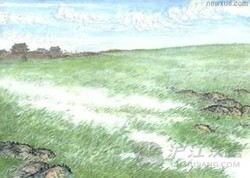Fù Dé Gǔ Yuán Cǎo Sòng Bié
(Farewell on an Ancient Plain)
By Bai Juyi(772-846)

Bai Juyi is the most prolific of the Tang Dynasty poets, He used simple verse to focus on the social issues of his day.
Fù Dé Gǔ Yuán Cǎo Sòng Bié is a sending off song. This poem uses very simple language and every word is exact and meaningful. It is popular in China and the third and fourth lines have become famous: "Each year it withers and flourishes. Wild fire can't burn it out". Even though the fire is strong, in the end, the grass is stronger. Something beautiful can be temporarily destroyed, but can re-emerge when the time is right.
Sources:
Encyclopaedia Britannica
Shirley's Inter-Art and Cross-Cultural Learning World
Fù Dé Gǔ Yuán Cǎo Sòng Bié is a sending off song. This poem uses very simple language and every word is exact and meaningful. It is popular in China and the third and fourth lines have become famous: "Each year it withers and flourishes. Wild fire can't burn it out". Even though the fire is strong, in the end, the grass is stronger. Something beautiful can be temporarily destroyed, but can re-emerge when the time is right.
Sources:
Encyclopaedia Britannica
Shirley's Inter-Art and Cross-Cultural Learning World
Pinyin Version |
Lí lí yuán shàng cǎo,
Yí suì yí kū róng. Yě huǒ shāo bú jìn, Chūn fēng chuī yòu shēng. Yuǎn fāng qīn gǔ dào, Qíng cuì jiē huāng chéng. Yòu sòng wáng sūn qù Qī qī mǎn bié qíng. |
English Translation |
Lush grass grows on the ancient plain,
Each year it withers and flourishes. Wild fire can't burn it out, It re-grows in the spring breeze. |
Chinese Text |
赋得古原草送别
离离原上草,一岁一枯荣。 野火烧不尽,春风吹又生。 远芳侵古道,晴翠接荒城。 又送王孙去,萋萋满别情。 |
Print Translations |
| ||
Audio |
Notation |
| ||